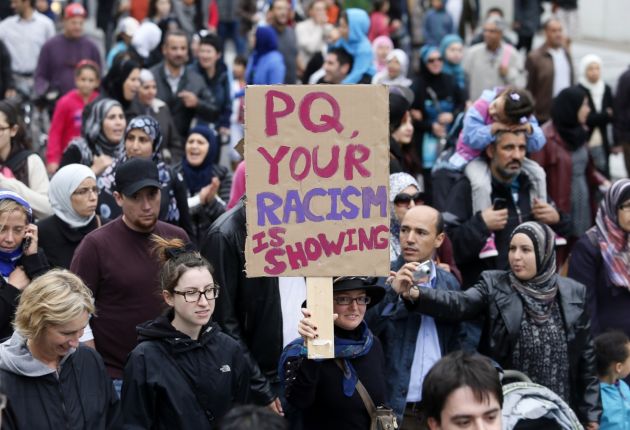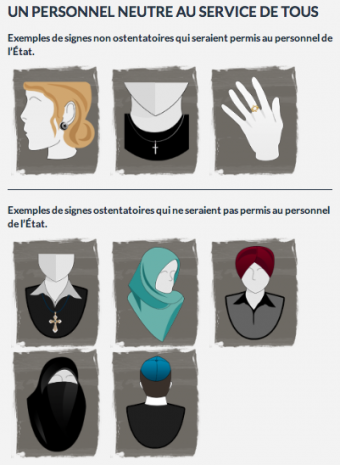Quebec 'secular' charter triggers Canada religious freedom fears

Religious and civil society groups have criticised a proposed Charter of Quebec Values defining the Canadian province as a secular State.
They say the charter is stirring religious tensions and some argue that it presents a grave concern for religious liberty.
Quebec's human rights commission has expressed concern about the provincial government's proposed charter stirring tensions after a Muslim family was attacked in a shopping centre in the provincial capital, Quebec City.
The governing Parti Quebecois' plan would prohibit public employees from wearing symbols such as large crosses and crucifixes, Jewish yarmulkes, Islamic headscarves and Sikh turbans as a way to establish "religious neutrality" in public.
The prohibitions would apply to civil servants, teachers, law enforcement officers, firefighters, doctors, nurses and public day care employees, but elected officials would be exempt. Universities and municipalities could seek a renewable, five-year exemption.

Badia Senouci, a Muslim woman who came to Quebec 14 years ago from Algeria, said she had never been the target of racist remarks until August 31, a few days after details of the values charter were leaked to a newspaper.
Two women, within just a few minutes, suggested Senouci change her religion, the Gazette newspaper in Montreal reported, citing media reports.
PARTI QUEBECOIS
The commission did not comment on the case, but said it is studying the ruling Parti Québecois's proposal, which would ban all ostentatious religious garb on public service employees, the Gazette newspaper in Montreal reported.
The Commission des droits de la personne and des droits de la jeunesse sent out a reminder Monday that individual rights, including the right to freedom of religion, is protected under the Quebec Charter of Rights.
"Everyone has to respect the rights of others," Jacques Frémont, president of the commission, said in a statement.
Paul Marshall, senior fellow at the Hudson Institute's Center for Religious Freedom, said in a September 12 interview with CNA, the Catholic News Agency, "The situation in Quebec in Canada is now very worrying,"
"It's a very dangerous, radical kind of secularization which is seeking to drive religion anywhere outside of the public square."
CNA said the proposed charter is a new declaration of the province's ideology, and would also change parts of the Quebec Charter of Rights and Freedom.
Marshall said the limitations on religious action presents a mindset that is "radically secular, and makes it the ideology of the province."
He cautioned that the ideology could impose limitation on religious dress and action for those not working directly for the government as well.
"When you have that mindset governing, it will go through all of the institutions and try to remove any religious element, and try to remove any element of conscience for people working in those institutions," Marshall told CNA.
"Anything which affects other people in the public life of the province, they're trying to squeeze out," he said.
Marshall noted, "When you have that mindset governing, it will go through all of the institutions and try to remove any religious element, and try to remove any element of conscience for people working in those institutions."
BERNARD DRAINVILLE
Bernard Drainville, the Quebec minister responsible for Democratic Institutions and Active Citizenship, which will oversee the proposed policies, said that the charter would affirm "the State's independence from religions.
"For this religious neutrality to take shape in public institutions, it must also show in the people who work for them," Drainville said in a youtube video explaining the proposals.
"We therefore propose to establish a duty of religious neutrality and reserve among state personnel. This duty would mean that state employees could not wear conspicuous religious symbols while they work."
Drainville announced that the province will develop guidelines for religious accommodations. However, he said, all accommodations "would have to respect basic Quebec values such as the equality of women and men and the State's religious neutrality."
"The religious accommodation must not undermine," those values said Drainville.
Rajan Zed, president of the Universal Society of Hinduism, said religious freedom is inherent right of all Canadians, including Quebecers.
"This proposed Charter clearly violated religious freedoms and might be an effort to distract Quebecers from the sluggish economy," he said in a statement on Tuesday.
"Masquerading as secularism, it appeared to be actually government sponsored discrimination targeting religious minorities; and was divisive, full of contradictions and risked fundamental freedoms," Zed noted, saying it hinted at xenophobia.
Arguments for the Quebec government's drive towards a secular society and state neutrality on religion did not seem to hold water, he said.
Zed asserted that the neutrality of an employee should be measured by the person's action and not according to dress.